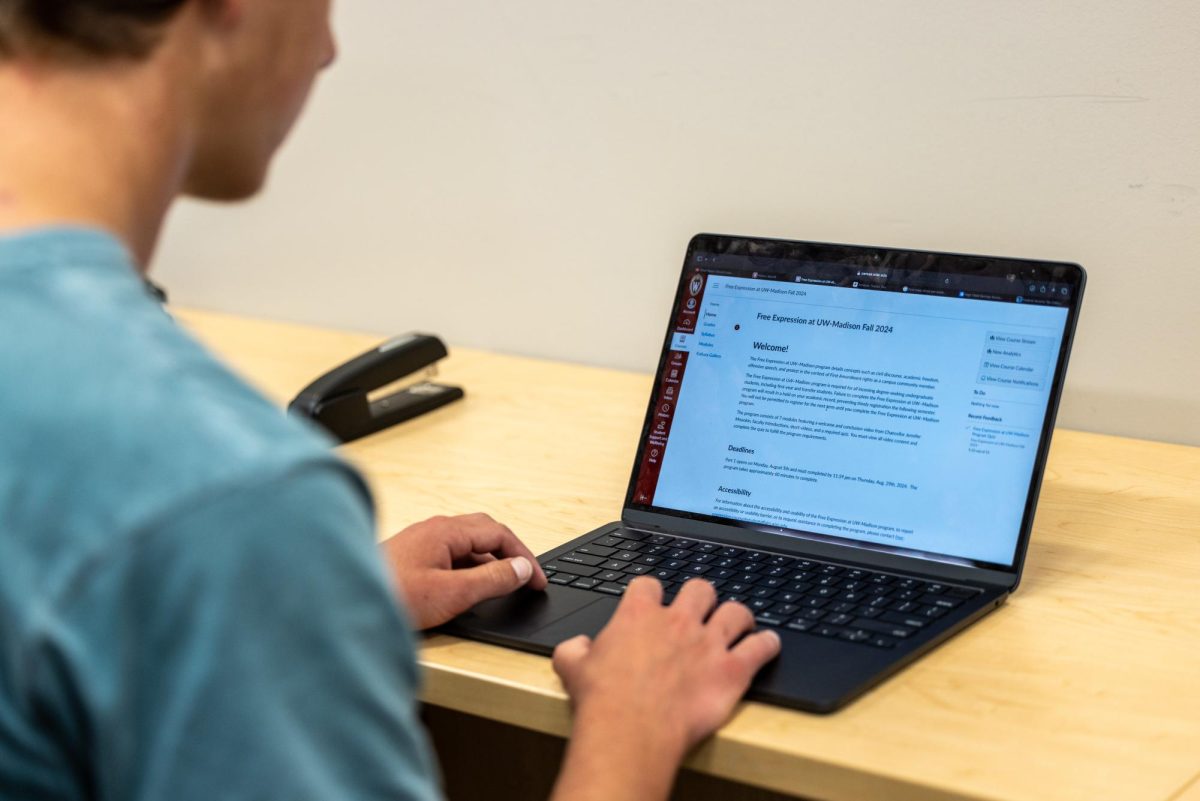The University of Wisconsin introduced a video module called “Free Expression” required for first-year and transfer students to watch as a part of a DEI deal reached in December 2023, UW spokesperson John Lucas said in an email statement. The module covers topics such as the First Amendment, academic freedom and protesting on campus.
The module focuses on communicating the rules of the First Amendment to students, specifically in a campus context. Chancellor Jennifer Mnookin appears in the opening statement, introducing the module by referencing the university’s renowned “sifting and winnowing” as a symbol of academic freedom — sifting and winnowing is affiliated with UW as a metaphor for the pursuit of truth in academics. She emphasizes “pluralism” as the presence of diverse viewpoints and asks students to approach these with respect.
“I ask you to disagree productively and also with respect for our common humanity,” Mnookin said in the module.
UW partnered with the Foundation for Individual Rights and Expression (FIRE) and New York University to implement the Free Expression module. FIRE is dedicated to maintaining free speech rights for university students and faculty and to improving conditions for free speech on campuses, according to FIRE’s Director of Policy Reform Laura Beltz.
The module’s requirement for first-year and transfer students was a part of the legislative diversity, equity and inclusion deal decided in December 2023, Lucas said in the email statement. The main outcome of the deal was a plan to reduce DEI funding in exchange for employee pay raises and funding for a new engineering building.
But this is not the first time UW has worked to communicate free expression information to students, Lucas said. For years, UW has provided information on protest guidelines in SOAR materials, at the start of semesters and — more recently — through the 2022 to 2023 launch of the Free Expression at the university, according to Lucas.
FIRE had two overarching objectives they hoped to communicate with their student modules — the detailed intricacies of the First Amendment and guidance for students on engaging with differing opinions, Beltz said.
Though administrators began planning the implementation of this module in December following the DEI deal, the official introduction of the modules was after a major student protest at the end of the spring semester. Protesters took part in a nearly two-week encampment on Library Mall in April demanding UW’s divestment from Israel. Those who participated in the encampment performed civil disobedience, a form of protest that the sixth video in the module covers.
Civil disobedience is the act of intentionally disobeying a law, policy or regulation to communicate a message, according to the module.
FIRE encourages students seeking to protest on campus to first familiarize themselves with the legal concepts involved, such as what kinds of protests are and aren’t protected and the specific school’s protest policies, Beltz said.
Students who plan to partake in civil disobedience should be aware of the possible consequences, such as fines, jail time, suspension and expulsion, according to the module. UW urges students considering civil disobedience to first contact the Office of Student Assistance and Support or the Office of Student Conduct and Community Standards for aid in avoiding potential disciplinary action.
Many schools modified their protest policies this past summer, some bringing in more restrictions on protest, Beltz said.
“I’m concerned that students might be getting the message that you shouldn’t get out and protest,” Beltz said. “But I am hoping that students will sort of use these as tools. There are ways to engage with each other, even if they are on controversial topics.”
The Free Expression module is required only for first-year and transfer students. Students may be entering a space for the very first time where they are encountering individuals whose opinions differ from their own, according to the module.
Engaging with peers from different backgrounds who retain contrasting values is a large part of what a university education should be, according to UW Law School Professor Anuj Desai. While it may not always be comfortable, understanding how to express one’s views with confidence while simultaneously being able to listen to those with different opinions is a large part of what learning is about, Desai said.
The second video, covering the First Amendment, states that public universities, such as UW, are required to adhere to First Amendment rights. A focal point of the module regarded professors’ right to divert class conversations to keep course lessons on track. According to the third video on academic freedom, questioning one’s professor is allowed and at times encouraged, but UW urges students to do so with respect.
Desai said professors have the freedom to steer classroom conversations toward the ultimate learning objectives.
“We’re in the business of educating,” Desai said.
Additionally, while UW discourages hate speech, according to the module, there is no “hate speech” exception to the First Amendment. UW encourages students who see or hear anything they believe has entered illegal conduct to alert the school and seek support.
The module says that offensiveness is inherently subjective, meaning that if it were to be outlawed, courts would have to mandate what defines “offensive speech.” This outcome, according to the module, could lead to a “loss of valuable ideas.”
FIRE survey data shows that many students are unfamiliar with their First Amendment rights and their school policies, Beltz said.
“We hope that students will be more likely to use their voices… rather than turning to something like violence,” Beltz said.
The module encourages students to be open to respectful communication with those who pose differing opinions because it allows students to become more “agile” thinkers and creates space for a more inclusive and dynamic campus environment.
A willingness to listen and an understanding of how to express one’s views with confidence without being overbearing are crucial aspects of open communication, Desai said.
“It’s really about inculcating values on how to engage in discourse and disagreement,” Desai said.



